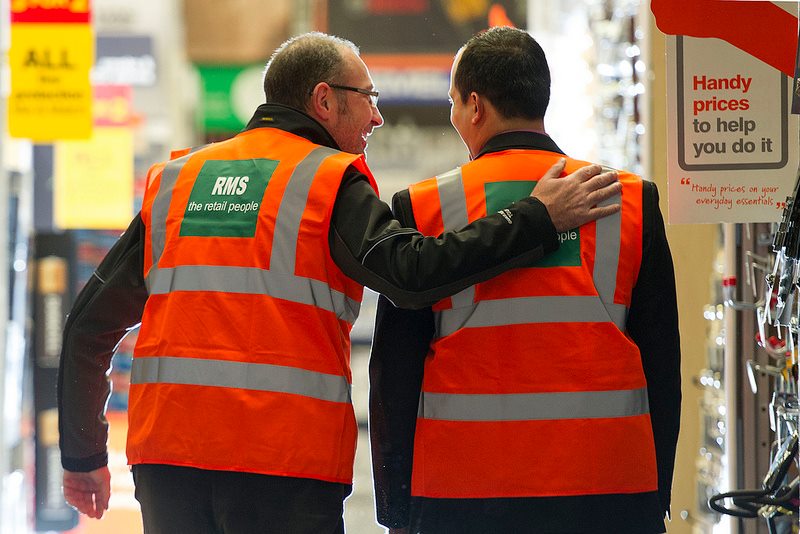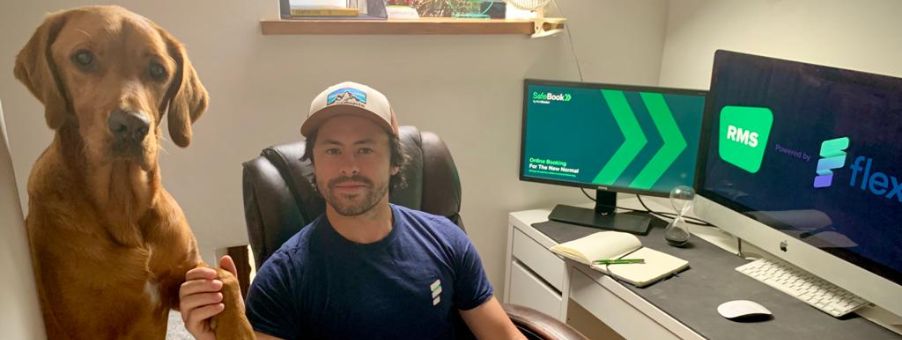We caught up with Dan, our CEO, who's been working from home (with Murphy, our Chief Morale Officer) over the past 4 months while dealing with the impact of Covid-19. As lockdown eases and the retail industry begins to get back on its feet, Dan talks about how RMS has fared during this period, and what he believes the future holds for the industry.
The last few months have obviously been turbulent and unpredictable. How has RMS fared during this period?
I think every business in the world has been affected by the pandemic in some way. It has been a very difficult time. Towards the tail end of March, as the lockdown was announced, RMS reached a peak. I say a peak, but it was like we were looking at the top of Kilimanjaro. There was this incredible demand for our services, and we were about five or six times busier than we usually would be at that time of the year. But as soon as we climbed that mountain, we were in a similar situation to most other businesses.
There was less demand for our services from retail stores as they leveraged different parts of their organisations and launched internal recruitment drives to support the ‘Feed the Nation’ campaign. Very quickly, RMS’s volume of work dropped – we experienced a very quiet April, and a subdued start to May.
So, myself and the management team had to act quickly. We applied for the CBILS (Coronavirus Business Interruption Loan Scheme) and were able to furlough over 300 employees, stripping the business right back to the bare essentials. The Government schemes helped us so much throughout lockdown by giving the company flexibility and supporting cashflow.
How are things looking now, as the country starts to get back on its feet in this post-lockdown setting?
The good news is that we are now starting to see a lot of positive engagement with our retail partners. Retail change projects are starting again, and RMS is entering a new phase of recovery. By the end of August, we hope to be in a position not dissimilar to previous years.
The last few months have been incredibly challenging, but I’m so proud of my team. Everyone has stepped up and done their jobs under difficult circumstances. I believe we’ve come through the crisis quite well, and we are in the best possible position to support the retail industry.
How has it felt leading your people throughout this crisis?
It has been difficult, but also eye-opening to see the engagement from the number of individuals that we have.
One of the biggest challenges we’ve faced as a business is digesting the government guidance. As it has been different for each of the 4 nations, it was sometimes difficult for us (whose workforce is based across the whole of the UK) to devise a company policy that had to change on an almost daily basis. And I should mention that we even had to understand the guidelines published by the Irish government, a different country entirely, because we were working across the border in Woodies and Boots.
Outside of that, there’s been consistent business updates to keep people engaged using technology such as Google Hangouts, Microsoft Team, or Zoom. This has allowed our people to engage flexibly and remotely, and it’s worked wonders.
We’ve continued to update our field teams, once every 4 weeks, of the wider changes and implications of the lockdown and what RMS is doing.
Our core management team – many of whom have been furloughed for several months – regardless of their status have been involved in a weekly Friday call on Google Hangouts. In these calls we provide an update on where the business is at and try to keep people as engaged as possible with the ongoing recovery strategy.
The main priority throughout this whole period has been the safety of our people. I urged my people to begin working from home before lockdown was officially announced and completing the necessary risk assessments has been imperative.

What are your thoughts on how the government has handled the pandemic, in regard to policies such as the Coronavirus Job Retention Scheme, for example?
Our government, like any government across the globe, was faced with an impossible task, because we had never really experienced a situation like this before. There’s always going to be criticism and lessons to be learned from.
They will be criticised for ending the lockdown too soon, or they will be criticised for having it in place for too long, and for it having such a negative effect on the economy that will have lasting damages beyond the pandemic. Because we haven’t had prior experience of anything like this, that balance is very difficult to predict. Only time will tell how right or wrong the decision making was.
I think how the government has handled the situation, without any preparation in place, has been pretty good. The Coronavirus Job Retention Scheme has been incredible, and I think it will save millions of jobs. However, because it’s not – and shouldn’t be – an infinite support mechanism, and it will come to an end, we will continue to see job losses throughout the year. But without it, the situation would have been a lot worse, so the government has done a fantastic job there.
My biggest criticism is the discrepancies in advice that was communicated to the 4 nations that make up the UK. When you are an organisation like RMS you have to be really switched on with processing all of the conflicting advice and laws that apply to the different nations. And of course, the delay in putting the lockdown in place; who knows how many deaths could have been prevented if action had been taken sooner?
How has RMS adapted during this time? (In terms of WFH, use of tech, new service, and whatever else comes to mind)
The pandemic has been it clear that businesses need to adapt, or they’ll die. RMS is in a very fortunate position where we’ve got hundreds of employees who have a range of skills and can do a lot of different things. We have been quite specific in the past with what types of work we deliver for our retail partners because we’ve never really explored outside of the boxes. Those retail partners have always wanted what they’ve wanted and we delivered exactly that.
But Coronavirus has made those retailers think differently about the kinds of operating models that work better for them; for example, the increase in dot.com sales. There’s more of a demand for picking and packing, distribution, and logistics. From a delivery perspective, there’s not enough drivers and not enough vehicles out there.
So, what we have been doing during this period is getting a better understanding of the capability of our teams throughout the organisation, and working with our retail partners so that we can create a model that works for them. Traditionally that was a 12-hour shift, predominantly at night. Going forwards it might be 4-hour slots and the first 4 hours of the day are focused on picking and packing for dot.com deliveries. It might be loading vehicles or doing the delivery itself. It might be marshalling the crowds that turn up at the door, or managing capacity in store. We’ve even developed software to support with capacity management called Safebook, but nevertheless, we are constantly looking to change.
Flexibility is a fundamental part of the business, and we are looking to evolve through this time to come out stronger than we’ve ever been before. In regard to working from home, those who can do work from home, and we are utilising technology to be more collaborative than we’ve ever been.
How do you see the future for the retail industry?
I think the most important thing is that if you’ve never had an online presence before, you need one now. If you were late to the party when it came to updating any of your tech, then it might be too late. If not, you’ve already made the necessary strategic changes within your organisation to drive the efficiencies necessary for a more streamlined and sophisticated operation for the new normal.
The bottom line is that technology is a key enabler in driving the efficiency necessary to have a profitable retail operation for the future. And it’s not just about cutting costs. It’s about the customer experience and the customer journey, and how the most successful organisations – regardless of whether they are open now or are opening later – will be very engaged with their customer base. They will demonstrate new and interactive ways of engaging with their end customer to keep them interested.
What are your thoughts on safety?
From a retail perspective, how do you not only ensure the safest operation you can for employees and customers, but go one step beyond that. It’s not just about providing safety; it’s about communication and building confidence. If you don’t build confidence, customers won’t be convinced that enough has been done. For example, if your operation breaches the 2m guidelines, you must ensure that there are proper mechanisms in place to ensure the safety of your people and customers, and that you communicate it well. That is going to be so important to give people confidence and get them back into stores.
What are your future plans for RMS and how are you going to adapt the business to cope with ‘new normal’?
Innovation is a core value of RMS, and we are constantly finding new ways to do it better.
Through a difficult time, we have managed to support our people as best as we possibly could. Their safety being the number one priority during this rebuilding phase, where people are returning to work and the company looks to the future.
In regard to development, we want to further invest in flex, the technology that powers our business and which will enable flexible working to be part of the new normal. As a side note, I just wanted to mention that we’ve got some really talented people in the company. We actually designed our own ‘track and trace’ system which was used by members of the field team to notify management if they were suffering from Covid-19 symptoms.
For RMS, the future is positive. Whilst the retail industry is undergoing massive change, we are an organisation that supports change. In fact, we effect change. As retailers adapt, we hope that they’ll look to us for the expertise and flexibility to deliver the necessary changes which will take their current business models, and transform them into a new model suitable for the new normal.
